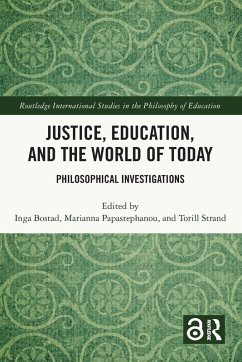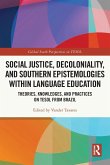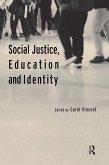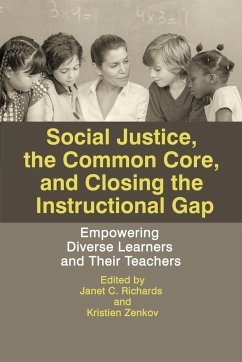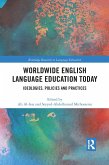Justice, Education, and the World of Today
Philosophical Investigations
Herausgeber: Bostad, Inga; Strand, Torill; Papastephanou, Marianna
Justice, Education, and the World of Today
Philosophical Investigations
Herausgeber: Bostad, Inga; Strand, Torill; Papastephanou, Marianna
- Broschiertes Buch
- Merkliste
- Auf die Merkliste
- Bewerten Bewerten
- Teilen
- Produkt teilen
- Produkterinnerung
- Produkterinnerung
This edited book challenges the limits of current educational philosophical discourse and argues for a restored normativisation of education through a powerful notion of justice.
Andere Kunden interessierten sich auch für
![Social Justice, Decoloniality, and Southern Epistemologies within Language Education Social Justice, Decoloniality, and Southern Epistemologies within Language Education]() Social Justice, Decoloniality, and Southern Epistemologies within Language Education54,99 €
Social Justice, Decoloniality, and Southern Epistemologies within Language Education54,99 €![Social Justice, Education and Identity Social Justice, Education and Identity]() Social Justice, Education and Identity43,99 €
Social Justice, Education and Identity43,99 €![Global Crises, Social Justice, and Education Global Crises, Social Justice, and Education]() Global Crises, Social Justice, and Education57,99 €
Global Crises, Social Justice, and Education57,99 €![Social Justice, The Common Core, and Closing the Instructional Gap Social Justice, The Common Core, and Closing the Instructional Gap]() Janet C. RichardsSocial Justice, The Common Core, and Closing the Instructional Gap64,99 €
Janet C. RichardsSocial Justice, The Common Core, and Closing the Instructional Gap64,99 €![Worldwide English Language Education Today Worldwide English Language Education Today]() Worldwide English Language Education Today53,99 €
Worldwide English Language Education Today53,99 €![Primary Teaching Today Primary Teaching Today]() Denis HayesPrimary Teaching Today39,99 €
Denis HayesPrimary Teaching Today39,99 €![Governing Higher Education Today Governing Higher Education Today]() Governing Higher Education Today49,99 €
Governing Higher Education Today49,99 €-
-
-
This edited book challenges the limits of current educational philosophical discourse and argues for a restored normativisation of education through a powerful notion of justice.
Produktdetails
- Produktdetails
- Verlag: Routledge
- Seitenzahl: 264
- Erscheinungstermin: 4. Oktober 2024
- Englisch
- Abmessung: 234mm x 156mm x 14mm
- Gewicht: 406g
- ISBN-13: 9781032355368
- ISBN-10: 1032355360
- Artikelnr.: 71603965
- Herstellerkennzeichnung
- Libri GmbH
- Europaallee 1
- 36244 Bad Hersfeld
- gpsr@libri.de
- Verlag: Routledge
- Seitenzahl: 264
- Erscheinungstermin: 4. Oktober 2024
- Englisch
- Abmessung: 234mm x 156mm x 14mm
- Gewicht: 406g
- ISBN-13: 9781032355368
- ISBN-10: 1032355360
- Artikelnr.: 71603965
- Herstellerkennzeichnung
- Libri GmbH
- Europaallee 1
- 36244 Bad Hersfeld
- gpsr@libri.de
Inga Bostad is Professor of Philosophy, Department of Education, University of Oslo, Norway. Marianna Papastephanou is Professor of Philosophy of Education, Department of Education, University of Cyprus, Cyprus. Torill Strand is Professor of Education, Department of Education, University of Oslo, Norway.
Introduction PART I - The Ontological and Socio-political Grounds for
Normativising Education through Justice 1. An Ethics of Rhythm and the
Philosophical As-If: Educational Aporia and Reimaging Justice as
Interdependence 2. 'Plastic Justice': A Metaphor for Education 3. What Does
Educative Justice Look Like? Or: What Happened as I Read Toni Morrison's
Recitatif PART II - Contextualising and Situating the Relation of Justice
and Education 4. Encountering the Promise of Happiness: In Search for a
Critical Space in Education 5. Justice in Dialogic Education: The Hegemonic
Use of "Truth" in Dialogue and Its Educational Limits 6. Responding to
Wrongdoing 7. Facets of Justice in Education: A Petroleum Nation Addressing
the United Nations Sustainable Development Agenda 8. Vulnerable Enough for
Inclusion? Unaccompanied Minors' Experiences of Vulnerability and Trauma on
Their Way to Norway 9. Virtues and Rituals: Confucianism and Education for
Justice 10. Higher Education under Consideration: Why Restorative Justice
(in Africa) Is Still Relevant? PART III - The Self and the World of Today:
Meta-Critical Considerations 11. Justice and the Conspicuous 12. Explaining
Teachers' Experiences of Injustice through Recognition 13. The Will to
Injustice: An Autoethnography of Learning to Hear Uncomfortable Truths
CODA: Justice, Education and the World of Today: Concluding Remarks
Normativising Education through Justice 1. An Ethics of Rhythm and the
Philosophical As-If: Educational Aporia and Reimaging Justice as
Interdependence 2. 'Plastic Justice': A Metaphor for Education 3. What Does
Educative Justice Look Like? Or: What Happened as I Read Toni Morrison's
Recitatif PART II - Contextualising and Situating the Relation of Justice
and Education 4. Encountering the Promise of Happiness: In Search for a
Critical Space in Education 5. Justice in Dialogic Education: The Hegemonic
Use of "Truth" in Dialogue and Its Educational Limits 6. Responding to
Wrongdoing 7. Facets of Justice in Education: A Petroleum Nation Addressing
the United Nations Sustainable Development Agenda 8. Vulnerable Enough for
Inclusion? Unaccompanied Minors' Experiences of Vulnerability and Trauma on
Their Way to Norway 9. Virtues and Rituals: Confucianism and Education for
Justice 10. Higher Education under Consideration: Why Restorative Justice
(in Africa) Is Still Relevant? PART III - The Self and the World of Today:
Meta-Critical Considerations 11. Justice and the Conspicuous 12. Explaining
Teachers' Experiences of Injustice through Recognition 13. The Will to
Injustice: An Autoethnography of Learning to Hear Uncomfortable Truths
CODA: Justice, Education and the World of Today: Concluding Remarks
Introduction PART I - The Ontological and Socio-political Grounds for
Normativising Education through Justice 1. An Ethics of Rhythm and the
Philosophical As-If: Educational Aporia and Reimaging Justice as
Interdependence 2. 'Plastic Justice': A Metaphor for Education 3. What Does
Educative Justice Look Like? Or: What Happened as I Read Toni Morrison's
Recitatif PART II - Contextualising and Situating the Relation of Justice
and Education 4. Encountering the Promise of Happiness: In Search for a
Critical Space in Education 5. Justice in Dialogic Education: The Hegemonic
Use of "Truth" in Dialogue and Its Educational Limits 6. Responding to
Wrongdoing 7. Facets of Justice in Education: A Petroleum Nation Addressing
the United Nations Sustainable Development Agenda 8. Vulnerable Enough for
Inclusion? Unaccompanied Minors' Experiences of Vulnerability and Trauma on
Their Way to Norway 9. Virtues and Rituals: Confucianism and Education for
Justice 10. Higher Education under Consideration: Why Restorative Justice
(in Africa) Is Still Relevant? PART III - The Self and the World of Today:
Meta-Critical Considerations 11. Justice and the Conspicuous 12. Explaining
Teachers' Experiences of Injustice through Recognition 13. The Will to
Injustice: An Autoethnography of Learning to Hear Uncomfortable Truths
CODA: Justice, Education and the World of Today: Concluding Remarks
Normativising Education through Justice 1. An Ethics of Rhythm and the
Philosophical As-If: Educational Aporia and Reimaging Justice as
Interdependence 2. 'Plastic Justice': A Metaphor for Education 3. What Does
Educative Justice Look Like? Or: What Happened as I Read Toni Morrison's
Recitatif PART II - Contextualising and Situating the Relation of Justice
and Education 4. Encountering the Promise of Happiness: In Search for a
Critical Space in Education 5. Justice in Dialogic Education: The Hegemonic
Use of "Truth" in Dialogue and Its Educational Limits 6. Responding to
Wrongdoing 7. Facets of Justice in Education: A Petroleum Nation Addressing
the United Nations Sustainable Development Agenda 8. Vulnerable Enough for
Inclusion? Unaccompanied Minors' Experiences of Vulnerability and Trauma on
Their Way to Norway 9. Virtues and Rituals: Confucianism and Education for
Justice 10. Higher Education under Consideration: Why Restorative Justice
(in Africa) Is Still Relevant? PART III - The Self and the World of Today:
Meta-Critical Considerations 11. Justice and the Conspicuous 12. Explaining
Teachers' Experiences of Injustice through Recognition 13. The Will to
Injustice: An Autoethnography of Learning to Hear Uncomfortable Truths
CODA: Justice, Education and the World of Today: Concluding Remarks

